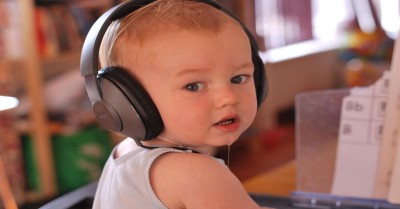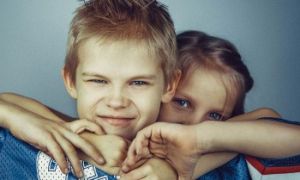Tremendous advances in brain imaging technology over the last ten years have led to a quantum leap in brain research. Among the research areas most studied by scientists is the effect of musical experiences on the brain development of children. The following article provides information on How Music Enriches Brain Development In Children, Playing Music Vs Listening To Music, Benefits Of Music and more.
How Music Enriches Brain Development In Children
More neural connections - Recent research has found that early musical training – especially before the age of seven – leads to higher brain plasticity resulting in more neural connections and synapses. These changes in turn have been directly correlated to better rhythm perception and auditory discrimination along with improved near-transfer (transfer to tasks within the same domain) effects on attention, working memory and task switching. In fact, early exposure to music training has even been linked to improved far-transfer effects in domains like verbal intelligence and executive functions, with some evidence supporting claims of better academic performance too.
Impact on pre-frontal cortex - In another study, a randomized design was used to test the effects of a laboratory-controlled music intervention on young infants’ neural processing of music and speech. Nine-month-old infants were randomly assigned to music (intervention) or play (control) activities for twelve sessions. The intervention played triple meter in music, like in waltz, to target temporal structure learning. This type of meter is usually difficult for infants, and it incorporated key characteristics of typical infant music classes to maximize learning like multimodal, social, and repetitive experiences.
The control group too were exposed to similar multimodal, social, repetitive play, but without music. After twelve sessions, the infants’ neural processing of temporal structure was tested in both music (tones in triple meter) and speech (foreign syllable structure). This processing was quantified by the mismatch response (MMR) measured with a traditional oddball paradigm using magneto-encephalography (MEG). What actually happened was that after the sessions, both groups – intervention and control – were given an opportunity to listen to waltz music in which the researchers has mistimed some of the last notes of the triple meter. The infants were also given a switch test Word in Japanese to test rhythm contrast. The infants who were exposed to music exhibited significantly larger MMRs in response to music temporal structure violations in both auditory and prefrontal cortical regions. In other words, the infants who had been exposed to music showed larger differences in not just auditory but also the prefrontal cortex for detection of changes in musical rhythm.
Since the pre-frontal cortex is also the site of higher-level cognitive functions like attention and executive functioning, the experiment was significant in showing the direct impact of the musical intervention on brain functioning, and more specific identification of changes in pattern.
Overall brain development - As children learn to make music, like by playing an instrument, both hemispheres of the brain develop connections needed to coordinate better. This is because creating music not just fires up the auditory cortex but also uses other areas of the brain like those that control linguistic and mathematical precision, creativity as well as fine motor skills needed to hold and play instruments with hands and fingers. Over time, as children learn and practise music with their teachers and peers, they gain important lessons in emotional and social skills as well.
Playing Music Versus Listening To Music
Making music has an even greater impact on the brain than listening to it. This is due to the fact that creating music needs creativity, precision in language and math, fine motor skills (such as the ability to grip and squeeze objects), and fine motor skills, all of which engage different parts of the brain. Utilizing these abilities entails creating a bridge between the two hemispheres of the brain, which enables information to travel through the brain more quickly and via various routes.
Benefits Of Music
- Young children's brains change when they are exposed to music. Among its many advantages, music can empower young children by lowering stress levels and enhancing emotions. Due to its cathartic qualities, sad music might even be beneficial because it helps kids connect with their emotions.
- Encourage the production of brain chemicals like oxytocin and dopamine. When things are made available, kids are urged to share toys, feel compassion for others, and have faith in them.
- Boost productivity and concentration.
- Boost grades and learning.
- Building a foundation for an interest in mathematics, engineering, computer science, and architecture is developing spatial intelligence.
- Increase your inventiveness and vocabulary.
In all these ways when young children are exposed to musical experiences – both listening to it and learning to create it – it sets the stage for all-around brain development and various types of learning.
Further Reading:
Benefits Of Music and Movement - Music naturally delights and moves most children. Throughout the early childhood years, children are learning to do new things with their body and music and movement encourages children to explore what they are able to do. The following article lists suggested learning objectives that support a child's overall development in music.
Brain Development In Early Childhood - The following article provides information on the fundamental cognitive milestones of brain development (6 months to 2 years), nature or nurture in brain development, the importance of nutrition in brain development and activities to promote brain development.
References:
- Miendlarzewska Ewa, Trost Wiebke (2014) ‘How musical training affects cognitive development: rhythm, reward and other modulating variables’. Frontiers in Neuroscience. Vol 7
- Baby Music: The Soundtrack To Your Child's Development, Unicef







 Toddlers have a greater understanding of the world around them by this stage. Their cognitive development (also known as intellectual development and thinking skills) continues
Toddlers have a greater understanding of the world around them by this stage. Their cognitive development (also known as intellectual development and thinking skills) continues Infants begin to develop trust when parents begin to fulfil their needs. Such as changing an infant's nappy when needed, feeding on request and holding
Infants begin to develop trust when parents begin to fulfil their needs. Such as changing an infant's nappy when needed, feeding on request and holding Beginning at birth the construction of thought processes, such as memory, problem solving, exploration of objects etc, is an important part of an infant’s cognitive
Beginning at birth the construction of thought processes, such as memory, problem solving, exploration of objects etc, is an important part of an infant’s cognitive Toddlers want to do more on their own and do not like it when you begin to establish limits on their behaviour. Tantrums can become
Toddlers want to do more on their own and do not like it when you begin to establish limits on their behaviour. Tantrums can become Your preschooler is now able to focus their attention more accurately and is less influenced by distractions. The intensity of questions increase as your child
Your preschooler is now able to focus their attention more accurately and is less influenced by distractions. The intensity of questions increase as your child John Dewey is often seen as the proponent of learning by doing – rather than learning by passively receiving. He believed that each child was active,
John Dewey is often seen as the proponent of learning by doing – rather than learning by passively receiving. He believed that each child was active, Toddler advance and gains new skills in Gross Motor Development milestones achieved throughout earlier years. Co-ordination and challenges that could not be performed before such
Toddler advance and gains new skills in Gross Motor Development milestones achieved throughout earlier years. Co-ordination and challenges that could not be performed before such Erik Erikson developed a psychosocial theory to understand how we each develop our identities through eight stages of psychosocial development from infancy to adulthood. The
Erik Erikson developed a psychosocial theory to understand how we each develop our identities through eight stages of psychosocial development from infancy to adulthood. The At this point preschoolers begin to interact effectively with others. Play becomes more innovative and organized and “boyfriend” or “girlfriend” begins to emerge. Preschoolers have
At this point preschoolers begin to interact effectively with others. Play becomes more innovative and organized and “boyfriend” or “girlfriend” begins to emerge. Preschoolers have From now, babies begin to identify and respond to their own feelings, understanding other's feelings & needs and interact positively with others. A baby's social and
From now, babies begin to identify and respond to their own feelings, understanding other's feelings & needs and interact positively with others. A baby's social and


